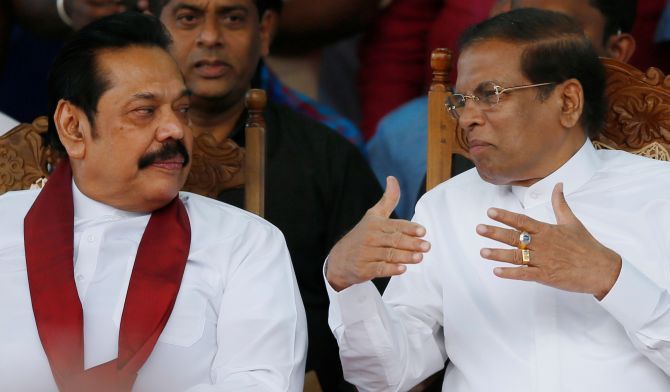
Sri Lankan President Maithripala Sirisena Friday dissolved the country's parliament, paving the way for an early general election expected to be held in January, amid a worsening constitutional crisis triggered by the surprise sacking of Prime Minister Ranil Wickremesinghe.
Sirisena signed a gazette notification to dissolve the nation's parliament with effect from Friday midnight, in another surprise move that comes after two weeks of political and constitutional turmoil.
The dissolution comes hours after a close aide of the President said Sirisena had decided that there will be no snap elections or a national referendum to end the current political and constitutional crises in Sri Lanka.
Analysts said tonight's dissolution was again unconstitutional in terms of the four and a half year term rule in the 19th amendment.
"We vehemently reject the dissolution of parliament. He has robbed the people of their rights", Wickremesinghe led United National Party (UNP) said in a statement.
A fresh parliamentary election could be held in early January following president Sirisena's sudden decision to dissolve the 225-member assembly, political parties said.
Sirisena signed an official notification dismissing the 225-member assembly well ahead of its August 2020 term expiry, state television reported.
Sri Lanka was plunged into a political crisis after Sirisena sacked Prime Minister Ranil Wickremesinghe on October 26 and replaced him with his former rival Mahinda Rajapaksa.
Wickremesinghe, who dubbed the move as a 'constitutional coup', has refused to vacate his official residence, saying he is the lawful prime minister and that the president has no constitutional right to replace him.
His request for a floor test to prove his majority in the House has been turned down.
He cited the 19th amendment to the Constitution in which the president has been barred from sacking a prime minister or dissolving parliament before the expiry of its four and a half years term.
After Wickremesinghe's sacking, Sirisena suspended parliament until November 16. It was to allow Rajapaksa to muster the 113 seats required to prove his majority.
Sri Lankan strongman and former president Rajapaksa, however, remains short of the 'magic number' 113 required to prove his majority in Parliament, his spokesman acknowledged on Friday.
Parliament Speaker Karu Jayasuriya on Monday slammed Sirisena's 'unconstitutional and undemocratic' actions to sack Prime Minister Wickremesinghe and suspend Parliament, saying he will not recognise Rajapaksa as the new premier unless he wins a floor test.
The assembly speaker wants the floor test to take place on November 14.
The sudden constitutional crisis came amid growing tensions between Sirisena and Wickremesinghe on several policy matters and the President has been critical of the Prime Minister and his policies, especially on economy and security.











 © 2025
© 2025